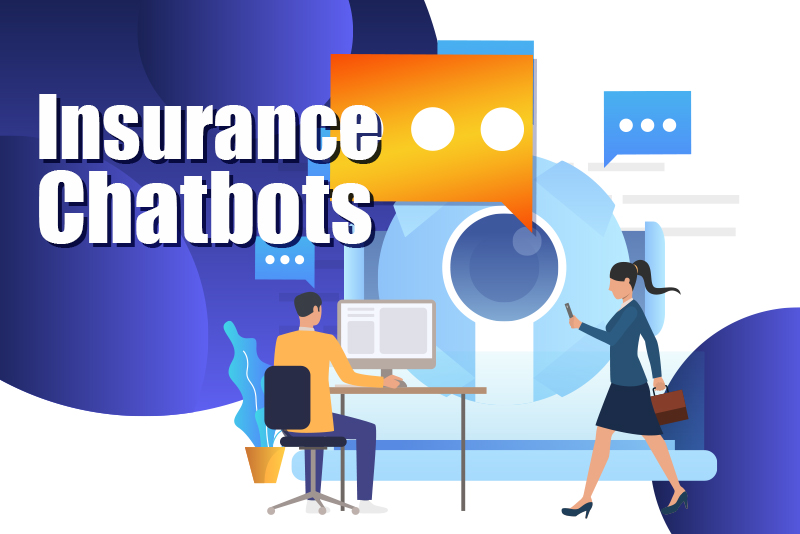The rapid trend of digitization has brought significant changes in diverse sectors and the insurance industry is no exception in this regard. Legacy systems in the insurance industry are transforming quickly. Customers expect seamless, on-demand services and a more personalized experience. Digitalization has demystified insurance processes for the customers. The increasing competition in the insurance industry has brought many options for customers to choose from. Nowadays, customers can shop for policies online, read reviews and compare offerings of different insurance providers and even self-service their policies. Investing in AI-powered insurance chatbots can help enhance customer experience. With an AI chatbot for insurance, you can provide 24×7 support, offer personalized policy recommendations and help customers every step of the way. They help effectively manage customer requests with instant responses and boost their experience and satisfaction. Experienced business process outsourcing companies can help you apply innovative AI chatbot technology effectively to empower insurance businesses in the long run.
Rising Impact of AI Chatbots
According to Genpact, 87 percent of insurance brands invested over $5 million in AI-related technologies each year. Playing a crucial role in the insurance industry, chatbots help to quickly enhance efficiency. Improving customer experience is one of the key strategic areas wherein insurers have placed a strong bet. The AI technology that is best suited to realizing that objective is Conversational AI – in the form of a chatbot or Intelligent Virtual Assistant.
In simple terms, an insurance chatbot is an AI-powered virtual assistant designed to cater to the needs of insurance customers at every stage of their investment journey. Chatbots are revolutionizing the way insurance brands acquire, engage, and serve their customers. It is estimated that about 71 percent of insurance executives strongly believe that customers will prefer interacting with an insurance chatbot rather than a human agent. An insurance chatbot utilizes artificial intelligence (AI) and machine learning (ML) technologies to automate a variety of processes that customer support personnel often do in the industry.
Key Benefits of Insurance Chatbots
Reports suggest that around 85 percent of insurance engage with their insurance providers on various digital channels. Insurance chatbots are beneficial for both insurance companies and customers alike. They can help brands acquire, engage, and serve their customers. By deploying an insurance bot, it becomes easy to cater to the needs of customers at every stage of their journey. Companies that use a feature-rich chatbot for insurance can provide instant replies on a 24×7 basis and thereby add significant value to their customer engagement efforts. Here are some of the key benefits of insurance chatbots:
- Simplify Complex Processes – The insurance processes can be quite complicated as they involve a huge amount of paperwork. According to a 2019 Statista survey, 43 percent of customers are comfortable using chatbots to buy insurance policies. 44 percent prefer using chatbots to make insurance claims. Chatbots can simplify the complex processes of insurance for customers by answering queries on policy options, terms and conditions, and claims processes. A chatbot can easily provide sufficient on-boarding information, ask the right questions to collect data and provide better options, and answer frequent questions that customers ask.
- 24/7 Real-time Service – Insurance is a24/7 service industry that involves a huge number of documents with a lot of complicated clauses, terms and conditions. This is because of stringent regulations in the industry. Likewise, customer queries exist on a large scale. An insurance chatbot ensures that every question and claim get a response in real time. Intelligent chatbots that leverage natural language processing (NLP) will not only be available 24/7 but also solve 80 percent of queries without human intervention. A conversational AI can hold conversations, determine the customer’s intent, offer product recommendations, initiate quotes and even answer follow-up questions.
- Improve Agent Productivity – Generally, insurance customer support teams receive a huge number of queries that tend to be repetitive in nature. An AI chatbot and the support agents can free up their valuable time to attend more demanding customer problems. In this way,an insurance company can serve a greater number of customers in a day. This helps deliver better customer satisfaction and improve team productivity.
- Streamlined Processes – Customers must deal with the complex processes of filling out endless paperwork and go through the complicated claim filing and approval process. Chatbots simplify and streamline these processes. This frees up customers from unnecessary paperwork and makes the claim approval process faster and more comprehensive.
- More Engaged Customers – By using an insurance chatbot, you can send prompts and real-time notifications to customers that will in turn improve brand engagement. AI bots can keep customers informed about the status of their claims, premium due dates, policy renewals and any new offers or updates.
- Cost Reduction – By using a chatbot, an insurance company can significantly reduce its customer support costs. Chatbots provide instant resolution and fast response to a major volume of customer queries that would otherwise require a large amount of customer support staff. By using a chatbot, an insurance provider can scale up their customer support efforts, instead of hiring and training a huge support team. In addition, the use of bots can help insurers minimize human errors and detect fraud by asking for more documentation from customers.
- Employee Support – As chatbots are available 24/7, they allow companies to upload relevant documents and FAQs that are used to answer customer questions and engage them in real-time conversations. Similarly, chatbots identify customers’ intent, give recommendations and quotes, help customers compare plans and initiate claims. This moves most of the unnecessary workload away from employees, letting them handle only the more complex queries for customers who opt for live chat. Most chatbot services also provide a one-view inbox that allows insurers to keep track of all conversations with a customer in one chatbox. This offers a better understanding of customer queries and lets multiple people handle one customer, without losing context.
- Simplify Claims Processing – When it comes to filing a claim, insurance chatbots provide a more efficient customer care experience. Instead of having to constantly follow-up on a claim with a customer care representative, the customer can simply communicate with the chatbot about the nature of their claim. The chatbot can easily locate the customer’s policy from the insurer’s database or CRM system, ask them additional details, and then immediately initiate the claims filing process- all this within minutes.
Artificial intelligence (AI) powered chatbot technologies are adding a new dimension to different aspects of insurance business. However, for the successful adoption of chatbots, you must identify a fine balance between human understanding and machine intelligence. Reputable providers of business process outsourcing solutions utilize these technologies to carry out various insurance processes in a more efficient manner.




